|
|
|
Sort Order |
|
|
|
Items / Page
|
|
|
|
|
|
|
| Srl | Item |
| 1 |
ID:
031445
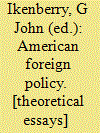

|
|
|
|
|
| Publication |
Boston, Scott, Foresman and Company, 1989.
|
| Description |
vii, 664p.
|
| Standard Number |
0673398153
|
|
|
|
|
|
|
|
|
|
|
|
Copies: C:1/I:0,R:0,Q:0
Circulation
| Accession# | Call# | Current Location | Status | Policy | Location |
| 030489 | 327.73/IKE 030489 | Main | On Shelf | General | |
|
|
|
|
| 2 |
ID:
065556
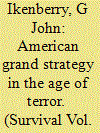

|
|
|
| 3 |
ID:
053166
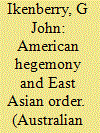

|
|
|
| 4 |
ID:
146070
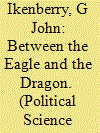

|
|
|
|
|
| Summary/Abstract |
G. JOHN IKENBERRY observes that East Asia is increasingly marked by the emergence of two hierarchies—a security hierarchy dominated by the United States and an economic hierarchy dominated by China. He argues that in this emerging regional order the United States will no longer exercise hegemony, rather it will be drawn into the region in new and more complex ways.
|
|
|
|
|
|
|
|
|
|
|
|
|
|
|
|
| 5 |
ID:
192014
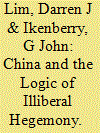

|
|
|
|
|
| Summary/Abstract |
We develop a theoretical logic and character of a Chinese model of international order. We begin by considering general problems of power transition and hegemonic order-building, with reference to the American experience with liberal hegemony. China will, like all powerful states, seek an order that protects its interests. But unlike its predecessors, China faces an existing order containing elements that threaten its domestic political and economic model. We describe this domestic model and consider how it might be defended at the international level—embedded in the logic and organizational principles of hegemonic order. Our contribution is to theorize the consequences of China’s hegemonic interests, including domestic preservation, and its order-building practices, for the operation and underlying character of a China-led hegemonic order. Though not inherently illiberal in form, we outline how the emergent order could generate illiberal outcomes. This article therefore theorizes the concept of illiberal hegemony.
|
|
|
|
|
|
|
|
|
|
|
|
|
|
|
|
| 6 |
ID:
117446
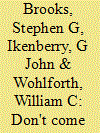

|
|
|
|
|
| Publication |
2012.
|
| Summary/Abstract |
After sixty-five years of pursuing a grand strategy of global leadership-nearly a third of which transpired without a peer great power rival-has the time come for the United States to switch to a strategy of retrenchment? According to most security studies scholars who write on the future of U.S. grand strategy, the answer is an unambiguous yes: they argue that the United States should curtail or eliminate its overseas military presence, abolish or dramatically reduce its global security commitments, and minimize or eschew efforts to foster and lead the liberal institutional order. Thus far, the arguments for retrenchment have gone largely unanswered by international relations scholars. An evaluation of these arguments requires a systematic analysis that directly assesses the core claim of retrenchment advocates that the current "deep engagement" grand strategy is not in the national interests of the United States. This analysis shows that advocates of retrenchment radically overestimate the costs of deep engagement and underestimate its benefits. We conclude that the fundamental choice to retain a grand strategy of deep engagement after the Cold War is just what the preponderance of international relations scholarship would expect a rational, self-interested leading power in America's position to do.
|
|
|
|
|
|
|
|
|
|
|
|
|
|
|
|
| 7 |
ID:
159464
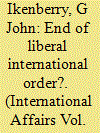

|
|
|
|
|
| Summary/Abstract |
These are not happy times for liberal internationalists. No one can be sure how deep the crisis of liberal internationalism runs. However, in what follows, I argue that despite its troubles, liberal internationalism still has a future. The nature of the crisis is surprising. The threats to liberal internationalism were expected to come from rising non-western states seeking to undermine or overturn the postwar order. In the face of hostile, revisionist states, the United States and Europe were expected to stand shoulder to shoulder to protect the gains from 70 years of cooperation. But, in fact, liberal internationalism is more deeply threatened by developments within the West itself. The centrist and progressive coalitions that lay behind the postwar liberal order have weakened. Liberal democracy itself appears fragile and polarized, vulnerable to far right populism and backlash politics. In recent decades, the working and middle classes in advanced industrial democracies—the original constituencies and beneficiaries of an open and cooperative international order—have faced rising economic inequality and stagnation. Within the West, liberal internationalism is increasingly seen, not as a source of stability and solidarity among like-minded states, but as a global playing field for the wealthy and influential. Liberal internationalism has lost its connection to the pursuit of social and economic advancement within western countries.
|
|
|
|
|
|
|
|
|
|
|
|
|
|
|
|
| 8 |
ID:
106338
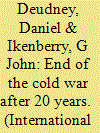

|
|
|
| 9 |
ID:
051401
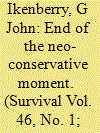

|
|
|
|
|
| Publication |
2004.
|
| Description |
p7-22
|
| Summary/Abstract |
In the past two years, a set of hard-line, fundamentalist ideas have taken Washington by storm and provided the intellectual rationale for a radical post-11 September reorientation of American foreign policy. But this new fundamentalism has turned into a costly misadventure. As a grand strategic approach to global leadership, it has failed. It is hard to think of another instance in American diplomatic history where a strategic wrong turn has done so much damage to the country's international position – its prestige, credibility, security partnerships and the goodwill of other countries – in such a short time, with so little to show for it. A single-minded American campaign against terrorism and rogue states in which countries are either ‘with us or against us’ and bullied into support is not leadership but a geostrategic wrecking ball that will destroy America's own half-century old international architecture. Long after the new fundamentalist thinking fades away, American diplomats will be repairing the damaged relations and political disarray it wrought.
|
|
|
|
|
|
|
|
|
|
|
|
|
|
|
|
| 10 |
ID:
103407
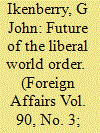

|
|
|
| 11 |
ID:
168926
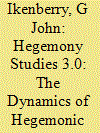

|
|
|
|
|
| Summary/Abstract |
After the end of World War II, various iterations of hegemony studies focused on such topics as the connection between hegemonic powers and the provision of international public goods, the causes of war during hegemonic transitions, and the stability of hegemonic orders. In this article, we discuss and forward the emergence of a new wave of international hegemony studies. This research program concerns itself with the politics of hegemonic orders and hegemonic ordering. It treats hegemonic orders as means, mediums, and objects of cooperation and contestation. It sees hegemons as not simply order makers but also order takers whose domestic political processes significantly interact with the dynamics of international order. It incorporates insights about how different dimensions of hegemonic orders interact to shape the costs and benefits of hegemony. In short, it treats hegemony and hegemonic orders as objects of analysis amenable to multiple theoretical perspectives and methodological approaches.
|
|
|
|
|
|
|
|
|
|
|
|
|
|
|
|
| 12 |
ID:
159463
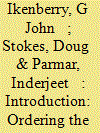

|
|
|
|
|
| Summary/Abstract |
The Trump presidency appears to personify, along with Britain's vote to withdraw from the European Union, a sense of deep crisis in the United States-led liberal international order (LIO). The two states that conceived and constructed a whole array of international institutions after 1945 now seem to be rejecting that order, or at the very least, demanding that its institutions either be reformed or recalibrated to better suit their purposes. However, both developments may signal a new phase in the evolution of the international system—more nationalistic, state-centric and transactional, in which costs and responsibilities are more widely shared and where the electorate questions the costs versus benefits of the postwar liberal consensus. This crisis has long been evident
|
|
|
|
|
|
|
|
|
|
|
|
|
|
|
|
| 13 |
ID:
073882
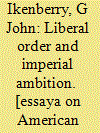

|
|
|
|
|
| Publication |
Cambridge, Polity, 2006.
|
| Description |
300p.
|
| Standard Number |
0745636497
|
|
|
|
|
|
|
|
|
|
|
|
Copies: C:1/I:0,R:0,Q:0
Circulation
| Accession# | Call# | Current Location | Status | Policy | Location |
| 051672 | 327.73009045/IKE 051672 | Main | On Shelf | General | |
|
|
|
|
| 14 |
ID:
059002
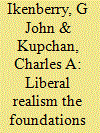

|
|
|
| 15 |
ID:
162387
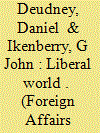

|
|
|
| 16 |
ID:
057766
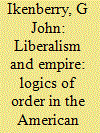

|
|
|
| 17 |
ID:
085690
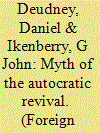

|
|
|
|
|
| Summary/Abstract |
Autocracies such as China and Russia do not represent a sustainable alternative to liberal democracy. In fact, the pull of liberal democracy is stronger than ever.
|
|
|
|
|
|
|
|
|
|
|
|
|
|
|
|
| 18 |
ID:
049362
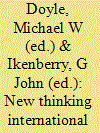

|
|
|
|
|
| Publication |
Boulder, Westview Press, 1997.
|
| Description |
viii, 296p.
|
| Standard Number |
0813399661
|
|
|
|
|
|
|
|
|
|
|
|
Copies: C:1/I:0,R:0,Q:0
Circulation
| Accession# | Call# | Current Location | Status | Policy | Location |
| 041565 | 327.101/DOY 041565 | Main | On Shelf | General | |
|
|
|
|
| 19 |
ID:
065894
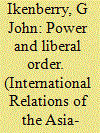

|
|
|
| 20 |
ID:
106342
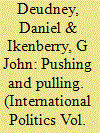

|
|
|
|
|
| Publication |
2011.
|
| Summary/Abstract |
The security environment of the Soviet state during the Gorbachev period was distinctly different from earlier periods. The increased number of non-aggressive states in the Soviet Union's international environment further enhanced the security of the regime in historically unprecedented ways. Nuclear weapons freed the Soviet Union from fears of territorial aggression, while making its own expansion too costly. The achievement of military parity with the West gave the Soviets a further enhanced sense of security. Nuclear weapons also created significant common threats from nuclear war, providing strong incentives for accommodation and cooperation. Looking from the post-Cold War era, both Reagan and Gorbachev finally turned out to be anomalies. The particular circumstances that had created the opportunities for extraordinary breakthroughs by the diplomacy of these two men disappeared almost as quickly as they had arisen.
|
|
|
|
|
|
|
|
|
|
|
|
|
|
|
|
|
|
|
|
|